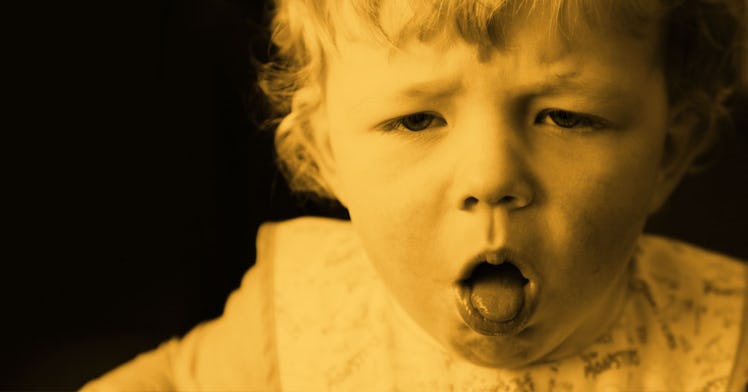How to Treat a Baby’s Cough the Right Way
Babies and over-the-counter medicine don't mix, which means that the only way to address a baby's cough is through natural remedies.

A baby’s cough can make any parent feel helpless. Seeing your child in pain sucks. There’s no sound more miserable than a coughing baby, and trying to get them to sleep when they’re sick is another story. Soothing a baby through a bad night’s cough can push any parent to their wit’s end. And unlike adults who can reach for the NyQuil, babies are far too small for cough medicine. Luckily, there are some practical and safe natural remedies for baby coughs that science has shown to be effective, even more so than the over-the-counter medicine parents might seek out.
“Research evidence, supported by every single respiratory society in America and Europe, has found that 90 percent of over-the-counter medicines do not much or nothing for a cough,” explains pulmonologist Dr. Gustavo Ferrer, founder of the Cleveland Clinic Florida Cough Clinic and author of Cough Cures: The Complete Guide to the Best Natural Remedies and Over-the-Counter Drugs for Acute and Chronic Coughs. And the cough medicines that do work, do so because of codeine, which is an opioid. Not the best idea for kids.
So, instead of looking to the pharmacy, Ferrer recommends that parents address the underlying issues with some natural remedies. “Kids’ coughs are usually due to viral infections and they usually have a day or so of fever chills, runny nose, and stuffy nose,” he explains. And it’s the runny nose, or post-nasal drip, that ultimately leads to the cough. To fix the baby’s cough, you have to resolve the drip.
“There is strong evidence for saline — salty water nasal spray that parents can spray into the nose. And children of any age can use it,” Ferrer says. But he also notes that adding xylitol, a common natural sweetener, can make the spray even better. “They neutralize the pH and avoids the burning sensation that sometimes happens with just the saline nasal spray. Plus, xylitol is an anti-inflammatory.”
The nasal spray helps thin and wash away mucus and the anti-inflammatory quality helps soothe swollen airways. For babies, it will make sucking troublesome snot out of their nose with a device like the Nosefrida that much easier.
But Ferrer also notes that it’s important to think of the environment the child is in as well. Coughs can be exacerbated by dry indoor air conditions. “Dryness is part of our lives today. We spend a lot of time indoors,” he says. “I would recommend a humidifier. They’re wonderful. You don’t have to buy the most expensive one. They tend to work very, very well.”
How to Treat a Baby Cough
- Stay away from over-the-counter remedies and focus on the post-nasal drip.
- Use saline nasal sprays can dry up nasal passages, add xylitol to reduce burning and add anti-inflammatory properties.
- Nasal sucking devices will help remove mucus too.
- Humidifiers help soothe coughs exacerbated by dry indoor air.
- Use honey sprinkled with clove and ginger to soothe coughs, but only for children over 12-months old.
Finally, parents can address the cough itself. Ferrer notes that many studies have found that honey often outperforms standard cough syrup in efficacy. But parents should use it with caution. Honey should not be given to babies under 12 months old. It can contain botulinum toxins that can make an infant very sick. For babies over 12 months old, however, a spoonful of honey will do wonders to help suppress a cough. The cough suppressing effects can be helped by sprinkling a tiny amount of ginger and clove powder (if you’ve got it) over the honey. The clove powder, in particular, can help numb nerves in the throat that tickle and lead to coughing.
Natural cough remedies like honey, moist air, and nasal sprays should go a long way toward helping a child feel more comfortable and keeping their coughing to a minimum. But parents should also understand when treating their baby’s cough requires help from a pediatrician.
“If the cough persists beyond one week and it’s associated with fever that persists more than three days, and there is yellowish mucus that’s when they should go to the doctor,” Ferrer explains.
But he also notes that parents shouldn’t expect to come home with antibiotics. The vast amount of baby coughs are linked to viral infections, and antibiotics only work for bacterial infections.
Most of the time, however, Ferrer notes that baby coughs will likely be resolved on their own with a little time and love. Sometimes, no intervention is necessary. “Look to see if the kids are being themselves, with one day or so of cough,” Ferrer says. “As long as the child is active and eating it shouldn’t be a concern. In fact, it’s a good thing and parents shouldn’t restrict their activities.”
This article was originally published on